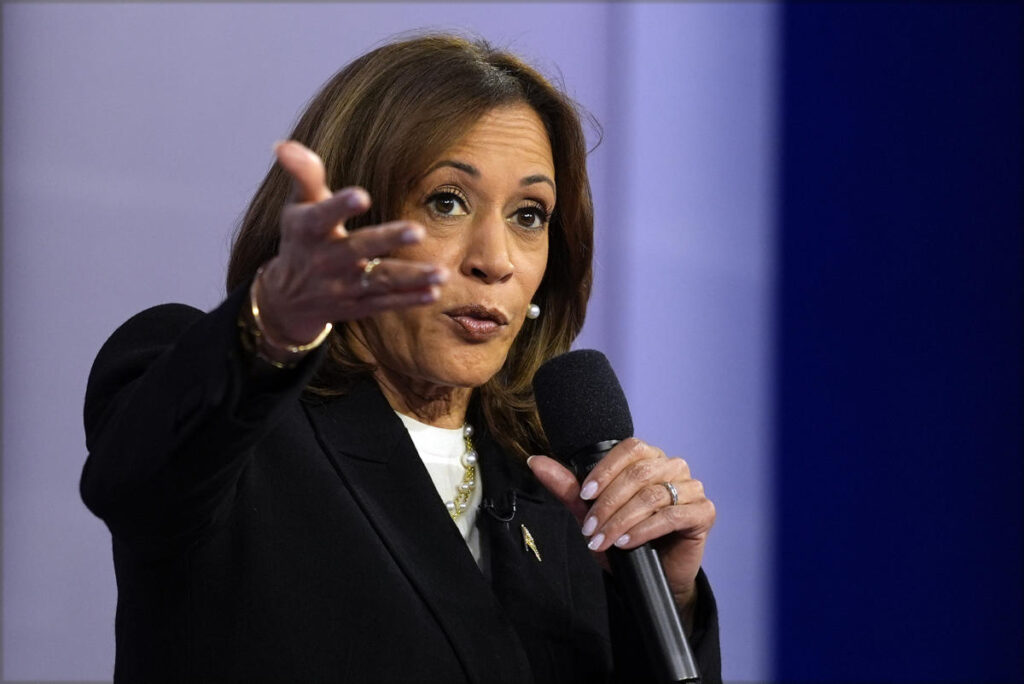On Wednesday, Vice President Kamala Harris participated in a CNN town hall in Pennsylvania, a critical battleground state ahead of the upcoming presidential election. The town hall, hosted by Anderson Cooper, served as a substitute for the second presidential debate, which former President Donald Trump opted out of. As early voting was already in motion and the race remained competitive, the town hall provided a platform for Harris to express her views and confront Trump’s legacy. The event featured questions from undecided voters and allowed Harris to engage in unfiltered dialogue about her policies and her perception of Trump as a political figure.
During the town hall, Harris did not shy away from calling Trump a “fascist,” referencing comments made by his former chief of staff John Kelly, who recounted Trump’s admiration for Nazi generals and Hitler. She asserted that Trump is “increasingly unstable” and unfit for office, citing testimonials from former Republican officials from Trump’s own administration who have labeled him as dangerous. When asked directly if she believed Trump was a fascist, Harris responded affirmatively, underscoring her conviction in his dangerousness as a leader and his potential threats to democracy.
Addressing economic issues, specifically inflation and grocery prices, Harris acknowledged that “the price of groceries is still too high” and vowed to prioritize driving prices down. She mentioned her commitment to combatting price gouging and proposed a national ban on such practices. Additionally, she suggested a need for increased affordable housing to combat rising rents, admitting that both Democratic and Republican administrations had not adequately tackled housing issues. This acknowledgment marked one of her rare criticisms of the Biden administration, emphasizing her desire for a new approach to the ongoing economic challenges faced by American families.
On immigration, a registered Republican voter sought clarity on how Harris would ensure safe integration for immigrants. Harris characterized the U.S. immigration system as “broken” and expressed support for bipartisan solutions, including funding for border wall construction. This seemed contradictory given her past criticisms of the wall. When confronted about the surge in migrant crossings, Harris noted that the Biden administration had successfully reduced illegal immigration by half but maintained that long-term legislative solutions were necessary for meaningful reform. She pledged to work towards a bipartisan bill that strengthened border security without compromising humane treatment of migrants.
Harris also addressed the contentious issue of abortion rights, emphasizing her commitment to codifying Roe v. Wade. When Cooper raised the challenge of Senate filibuster rules, she suggested considering a filibuster carve-out for national abortion protections in light of a rising number of restrictive laws post-Roe. Harris framed access to healthcare as a right, further asserting that all Americans deserve the right to health care regardless of their financial situation. She communicated a clear stance that while her views evolve over time with experience, her core values around health care and ethical governance remain steadfast.
In revealing a more personal side, Harris shared her spiritual practices and how she sought guidance from her pastor in significant moments, emphasizing the importance of faith in her leadership. The town hall touched upon complex geopolitical issues as well, including the Israeli-Palestinian conflict and rising anti-Semitism. Harris condemned the loss of innocent Palestinian lives and advocated for measures to address both anti-Semitism and systemic hate crimes in America. Throughout the discussion, she skillfully navigated between personal reflections, policy advocacy, and her critical stance towards Trump, portraying a vision for her presidency rooted in empathy, inclusivity, and moral accountability.

